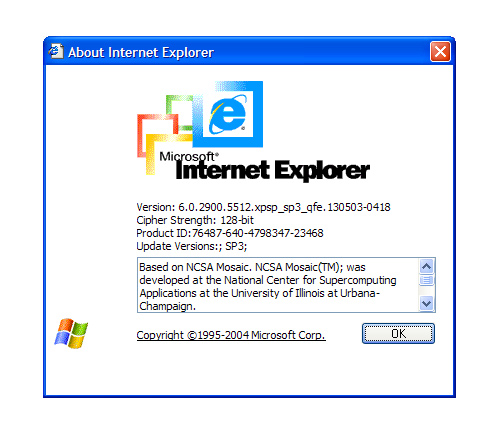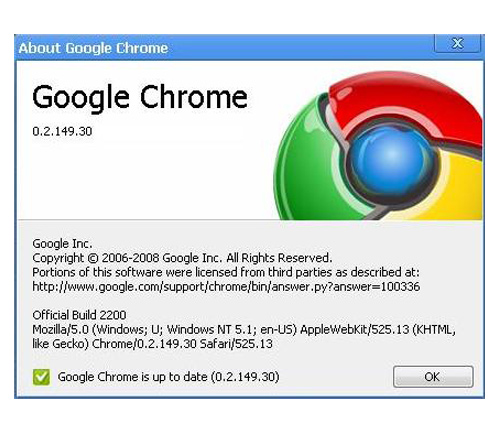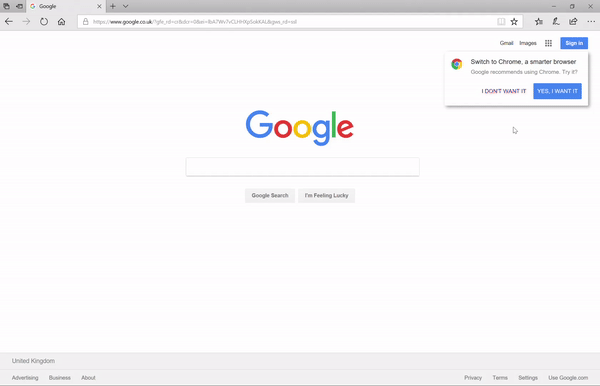A web browser is the tool we use to navigate the web. Before Google, Mozilla, Safari or Opera came into the market, there was the time when the browser market was dominated by Microsoft's Internet Explorer.
It was an innovative browser more than capable at that time. It was the first that implemented the new web technologies that allowed for greater interactivity; it had a striking interface and could do what others couldn't. What's more, IE was pre-installed on all Windows operating system, making its reach even wider.
Microsoft’s PC dominance with Windows peaked in the 90s and early 2000s. Alongside Intel, Microsoft spent at least $1 billion promoting the release of Windows XP, with a TV commercial featuring Madonna. It was an era before the iPhone, iPod, Android, Gmail, or YouTube.
Microsoft didn’t even have competition from Google at the time. Microsoft was a technology company that could do whatever it liked.
As Windows XP grew in popularity, so did the web. Internet Explorer 6 arrived just when the “dot-com" bubble was collapsing, and internet usage was growing rapidly. For many, IE was the primary way of accessing the internet, and the "E" logo has even become synonymous with the internet.

At its peak in 2002 and 2003, Internet Explorer 6 dominated more than 95 percent of the entire browser market, taking away huge chunks of out of Netscape (Firefox's ancestor).
Winning the the first ever browser war against Netscape, IE has the ability to display dynamic HTML, CSS and baked with its own security measures, it paved a clear way for Microsoft's domination.
For that reason, at that time, every major website started to target IE, to the point that those websites won't function correctly or fully in other browsers.
Because of its dominance, Internet Explorer 6 was Microsoft's monopoly on the web, and started ignoring the web standards at the time. This forced web developers to create websites according to IE's rules, and this was a path of painful decisions they have to make for years.
Then in the mid-2000, rivals started to emerge. The Mozilla Foundation, founded by the former browser maker Netscape, released Firefox 1.0. The browser introduced tabbed browsing and a pop-up blocker. It was regarded as the first ever Internet Explorer killer, and a powerful alternative since Netscape.
Unhappy with Firefox, Microsoft released IE 7 in 2006. The version also had tabbed browsing and kept other features that made people loyal to Windows. But still, IE 7 didn't change Microsoft's thought about the web' standards. And as Microsoft became even more ignorant, even the inventor of the World Wide Web, Tim Berners-Lee criticized Microsoft.
When Mozilla released the first version of Firefox, Google was also growing its dominance. But at that time, it was so busy to be a competitor that it was creating a Google Toolbar (one of the projects led by Sundar Pichai).
The toolbar was an add-on for Internet Explorer or Firefox that added a pop-up blocker and easy access to Google search. It was Google's way to add functionalities of Google directly into browsers, making people use Google's services. With Toolbar, Google promoted its search engine pages.
Then in 2008, Google finally entered the competition with Chrome browser version 0.2.149.
As a newcomer in the competition, Chrome was a follower of web standards, and respected HTML5. Introducing some new features that weren't available on other browsers, and also due to Google's increasing popularity inside the web, developers started to experiment with Chrome.
At fist, Chrome enabled them to build faster websites based on web standards. This started a consumer war or market share between Internet Explorer, Firefox, and the new Chrome.

Then, fast forward to the year 2011. At that time, the hot new browser Google Chrome was the rising star. It quickly overtook Firefox with the ability that no other browsers can do. And with Google's domination on the web (Microsoft dominated desktop), its products target Chrome exclusively. What this means, some Google products only functions fully when the user uses Chrome.
And once again, browser war happened, and again it becomes disturbing.

Google is a company that thrives on the web. The company wouldn't exist if it weren't for truly open web standards. But more and more, Chrome is becoming the new Internet Explorer 6.
Chrome becoming the popular browser ahead of others, was also because Android's popularity and the rise of Chrome on both PCs and Macs. And here, Chrome becomes the gateway for Google to continue its domination by having the control of how most internet user access the web and their personal information.
Chrome becomes Google's powerful entry point in the company’s vast toolbox.
With Google Chrome having an advantage and the ability to work across many different operating systems back in its early days, the browser became more popular than others. It started to ignore those standards and force people to use Chrome.
In other words, Google is becoming the new Internet Explorer 6 back in the days, with web developers primarily optimizing their websites for Chrome and tweaking for rivals later.
